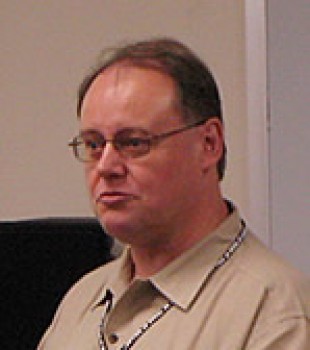Ph.D. - Geography
Wilfrid Laurier University in Waterloo, Ontario, Canada - 1997
Professional Preparation
M.A. - Geography
Free University of Berlin - 1988
Free University of Berlin - 1988
B.A. - Geography
Free University of Berlin - 1983
Free University of Berlin - 1983
Publications
Patuelli R., D. A. Griffith, M. Tiefelsdorf and P. Nijkamp. Spatial Filtering and Eigenvector
Stability: Space-Time Models for German Unemployment Data, International Regional Science
Review, 34: 253-280 2011 - Publication
Berry B., D. Griffith, and M. Tiefelsdorf From spatial analysis to geospatial science. Geographical
Analysis, 40:229-238 2008 - Publication
Tiefelsdorf M., and D. A. Griffith, 2007. Semi-parametric Filtering of Spatial Autocorrelation: The
Eigenvector Approach. Environment and Planning A, 38: 1193-1221 2007 - Publication
Tiefelsdorf, M. Controlling for Migration Effects in Ecological Disease Mapping of Prostate
Cancer. Stochastic Environmental Research and Risk Assessment, 21:615-624 2007 - Publication
Wheeler D., and M. Tiefelsdorf, 2005. Multicollinearity and Correlation among Local Regression
Coefficients in Geographically Weighted Regression. Journal of Geographical Systems. 7:161-187 2005 - Publication
LeSage James, Kelley Pace, and Michael Tiefelsdorf, 2004. Methodological Developments in
Spatial Econometrics and Statistics, Geographical Analysis, 36, 87-89. Editorial of Geographical
Analysis special issue on Spatial Econometrics and Spatial Statistics. 2004 - Publication
Mei-Po Kwan, Alan T. Murray, Morton E. O'Kelly, and Michael Tiefelsdorf, 2003. Research on
Accessibility in Space and Time: Future Prospects. Journal of Geographical Systems, 5, 129-138 2003 - Publication
Tiefelsdorf, Michael, 2003. Misspecification in Interaction Model Distance Decay Relations: A
Spatial Structure Effect. Journal of Geographical Systems, 5, 25-50 2003 - Publication
Appointments
Associate Professor
The University of Texas at Dallas [2005–Present]
The University of Texas at Dallas [2005–Present]
Adjunct Professor
The University of Manitoba [2000–2003]
The University of Manitoba [2000–2003]
Assistant Professor
The Ohio State University [2000–2005]
The Ohio State University [2000–2005]
Assistant Professor
The University of Manitoba [1998–2000]
The University of Manitoba [1998–2000]
Academic Assistant and Departmental Computer Administrator
Free University of Berlin [1989–1996]
Free University of Berlin [1989–1996]
Statistician
Federal Health Office of Germany [1988–1990]
Federal Health Office of Germany [1988–1990]
Research Assistant
Free University of Berlin, Germany [1984–1988]
Free University of Berlin, Germany [1984–1988]
Assistant Editor
Hrzu [1980–1981]
Hrzu [1980–1981]
Additional Information
Professional Memberships
-
since 1996 The American Association of Geographers
- with Specialty Groups:
- Spatial Analysis and Modeling
- Medical Geography
- Geographic Information Systems
- since 1998 Regional Science Association International
- since 1999 American Statistical Association
- since 2002 The Canadian Association of Geographers
Professional and University Citizenship
Editorship- 2002-2003 Guest editor jointly with James LeSage and Kelley Pace. Special issue of Geographical, Analysis on "Spatial Statistics and Spatial Econometrics", Volume 36, 2004.
- since 2008 Editorial board member of Geographical Analysis
- since 2010 Editorial board member of the Annals of the Association of Geographers
- 2009 Consultation of Dr. Steven Mentzer’s research lab on spatial and statistical pattern analysis Nonsprouting Angiogenesis at the Brigham and Women's Hospital, Harvard Medical School, Boston
- Annals of the Association of American Geographers
- Environment and Planning A
- Environment and Planning B
- Social Science & Medicine
- Papers in Regional Science
- International Journal of Geographical Information Science
- Computers & Geosciences
- Encyclopedia of Social Measurements
- Geographical Analysis
- Journal of Geographical Systems
- Stochastic Environmental Research and Risk
- Cancer Epidemiology, Biomarkers and Prevention
- National Science Foundation
- 2005 National Institutes for Health review panel “Community level health promotion study section” (February 2005)
- 2011 National Institutes for Health review panel "Deepwater Horizon (DWH) Disaster, Research Consortia (U19)" (April 2011)
- 1988 to 1996 Chair of the departmental committee for educational computing services in the Department of Geography at the Free University of Berlin. During my tenure as chair we were able to generate DM 700,000 in funds for several departmental computer labs.
- 1998 to 2000 Member of the Graduate Committee and organizer of the Graduate Seminar Series at the University of Manitoba.
- 1998 to 2000 Chair of the departmental ad hoc committee for technical services at the University of Manitoba. During my tenure as chair we were able to modernize the departmental computing facilities for student instructions (internal grant of Can$ 75,000) and the departmental webpage.
- 1999 until 2000 Member of the Dean’s committee to develop an Integrate Program in Environmental Systems for the Faculty of Arts and the Faculty of Science at the University of Manitoba.
- 2002 Member of the ad-hoc Committee "Position Statement of the Spatial Analysis and Modeling Track" in the Department of Geography at the Ohio State University
- 2002 until 2003 Member of the ad-hoc Committee "Development of a Human Environmental Undergraduate Track" in the Department of Geography at the Ohio State University
- 2005 until 2010 Member of the teaching effectiveness committee at UTDallas
- 2007 until 2011 Member of the Library Committee at UTDallas
- 2008 Member of the search committee for a program head of the Geo-Spatial Information Sciences program at UTDallas
- 2003 Participation in the course Spatial Epidemiology: Methods and Applications (Instructor Professor Dr. Jon Wakefield) during the Summer Program in Applied Statistical Methods, sponsored by The Ohio State University, Center for Biostatistics
- 2004 Participation in the course Epidemiologic Study Design & Analysis (Instructor Professor Dr. Kenneth J. Rothman) during the Summer Program in Applied Statistical Methods, sponsored by The Ohio State University, Center for Biostatistics
- 2009 Annual Affiliates Meeting of the “Texas State Data Center/Business and Industry Data Center” May 12-12, 2009, Austin, TX
- Geographic Information Systems, 6 credit hours lecture including lab
- Advanced Geographic Information Systems, 6 credit hours seminar including lab
- Research Methods, 6 credit hours lecture including lab. Required course for all undergraduate and graduate students.
- Seminar in Medical Geography, 3 credit hours.
- Applications of Quantitative Methods in Geography. The Linear Model and Spatial Extension. 5 credit hours including lab component. Required course for all graduate students
- Applications of Quantitative Methods in Geography. Spatial Statistical Modeling. 5 credit hours including lab component. Required course for all graduate students
- Programming for Geographers with Visual Basic. 5 credit hours including lab component
- Seminar in Medical Geography. 5 credit hours
- Seminar in Disease Mapping. 5 credit hours
- Seminar in Advanced Topics in Population Geography. 5 credit hours
- Lead Coordinator of GISc capstone course Geospatial Information Sciences Master’s Projects, 3 credit hours
- Coordinator of GIScience Ph.D. Research Project Qualifier, 3 credit hours
- Geospatial Data Analysis Fundamentals, required 3 credit hours plus 2 lab hours
- Spatial Pattern Analysis. 3 credit hours
- Demographic Modeling and Analysis. 3 credit hours
- Advanced Regression Analysis in the Social Sciences. Required course, 3 credit hours
- Regression Analysis with Spatial Application. Required course, 3 credit hours
- Coordinator of the parallel sections Introduction to Social Statistics with Lab
- Introduction to Social Statistics with Lab. Required course, 4 credit hours
- Spatial Dimensions of Health and Diseases. 3 credit hours
- Population and Development, 3 credit hours
- Introduction to Econometrics. Required course, 3 credit hours
- Introduction to Social Statistics with Lab. Required course, 4 credit hours
- Weeklong NSF funded training workshop on Spatial Filtering Modeling for Environmental, Health and Social Scientists and Applied (see http://www.spatialfiltering.com).
- Weekend workshop for the general University community Exploring Geographical Information Systems (see http://www.ExploreGIS.spatialfiltering.com)
- Several sessions for students and faculty introducing to the statistical software environment and its didactical interface RCMDR (see http://www.ThinkR.spatialfiltering.com)
News Articles
UT Dallas Hosts Spatial Filtering Conference
 Most homeowners would agree that their property values are affected by the value of their neighbors’ homes. Geospatial scholars call this underlying factor a spatial spill-over effect. Ignoring spill-over effects can skew statistical results, leading appraisers to undervalue a property surrounded by low-priced homes, for example.
Most homeowners would agree that their property values are affected by the value of their neighbors’ homes. Geospatial scholars call this underlying factor a spatial spill-over effect. Ignoring spill-over effects can skew statistical results, leading appraisers to undervalue a property surrounded by low-priced homes, for example.Spatial filtering refers to a new spatial analysis technique that takes spill-over effects into account. It essentially allows analysts to extract spatial dimensions that may lead to biased results. This new discipline is the subject of an academic workshop held at UT Dallas this week.
